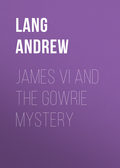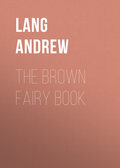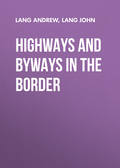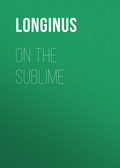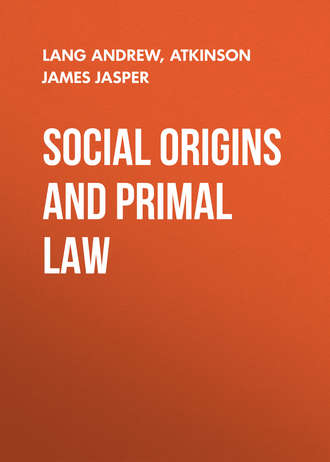
Lang Andrew
Social Origins and Primal Law
APPENDICES
APPENDIX A
ORIGIN OF TOTEMISM
In the following village sobriquets from the south-western counties of England the people are styled 'eaters of' this or that.328
ENGLISH VILLAGE SOBRIQUETS

Compare with these the following sobriquets of Siouan old totem kins, counting descent in the male line.
SIOUAN NAMES OF GENTES
Eaters
Eat the scrapings of hides
Eat dried venison
Eat dung
Eat raw food
Among the Sioux we have also noted the sobriquets
Non-Eaters of
Deer
Buffalos
Swans
Cranes
Blackbirds, etc.
These sobriquets of non-eaters are probably totemic: the Deer kin does not eat deer, nor does the Crane kin eat cranes, and so on. Totem kins are named from what they do not eat; many totem kins with male descent are nicknamed from what they do eat, or are alleged by their neighbours to eat.
GROUP SOBRIQUETS IN ORKNEY
In the following letter, which I owe to the kindness of Mr. Duncan Robertson, we read that, in Orkney and Shetland, local sobriquets are derived from what the people are alleged to eat. The tradition is, Mr. Robertson informs me, that each group is named after the edible plant or animal which it brought when engaged in building the Cathedral of Kirkwall.
Crantit House, St. Ola,Orkney,Jan. 29, 1903.
Dear Mr. Lang, – My tyrannical doctor won't let me out yet, so that I have not been able to collect all the information I should like to get for you about the Orkney nicknames – or 'bye-names,' as they are called here.
Here follows the list as taken from Tudor's The Orkneys and Shetland, with alterations:
I. MAINLAND OR POMONA

II. SOUTH ISLES

South Ronaldshay

III. NORTH ISLES

These are all the names I know or can hear of in Orkney. I wrote to Mr. Moodie Heddle of Cletts on the subject, as I knew him to take a great and intelligent interest in all such topics; and I have a most interesting letter from him, of which I shall give you the gist. He says he has no doubt that the origin of the names is that which you suggest, though some of the names do not at first sight appear to bear this out. Kirkwall 'Starlings' are easily accounted for, assuming that there have always been as many starlings about Kirkwall as there are now. They may well have been eaten by the townsfolk. I have tried them, and their breasts are not at all bad.
Skerry-scrapers. – The allusion here is to men who live off shell fish, 'dilse,' etc. off the skerries. There are – or were – excellent oysters on the St. Andrews skerries. Mr. Heddle tells me he has heard a woman insulting a man by saying she supposed he would soon leave no limpets in a certain bay, meaning that he was too lazy to work for his living.
Skate-rumple is, of course, the skate's tail. Deemess is the nearest land to a famous piece of water for skate, known as 'the skate-hole.'
Holm 'Hobblers' I do not understand, but shall make some further inquiries. I have an idea it is a reference to some bird; Mr. Heddle thinks it has something to do with seals, but neither of us knows.
Yearnings are, of course, the dried stomachs of calves used for making cheese.
Oysters. – The bay of Firth was famous for its oysters till the beds were overfished and destroyed some thirty years ago.
Stromness 'Bloody-puddings'– Mr. Heddle suggests that the people bled their cattle twice or thrice a year and made 'puddings' of the blood. This, of course, was done in the Highlands at one time.
Assie-pattles. – Either those who lay in the ashes or, Mr. Heddle suggests, who ate cakes baked in the ashes. Before iron girdles came much into use cakes were baked on flat stones; and there is a hill, known as 'Baking-stone Hill,' where the people used to come for stones that would not split in the fire. The peats used in Sandwick have a very red ash, which colours all persons and things near it.
Harray 'Crabs.'– Harray is the only parish in Orkney which does not touch the sea, and the name is given in irony. The old 'tee-name' is said to have been 'sheep.' The story is told that some fishermen passing through Harray dropped a live crab. The men of Harray could not make it out at all, and sent for the oldest inhabitant, who was brought in a wheel-barrow. After gazing at the monster for a few moments he exclaimed: 'Boys, hid's a fiery draygon; tak' me hame!'
I suspect there is some other tee-name than 'sheep-thieves' for the Rendall people, but will try to find out and let you know.
Hoy 'Hawks'– Mr. Heddle, who was formerly proprietor s²xof Hoy, says he thinks 'auks' must have been the original word, as he believes 'tammy-nories' was the old name. 'Auk' is Orcadian for the common guillemot, and a 'tammy-norie' is a puffin. Both of these birds abound in Hoy.
Mr. Heddle also tells me that the old name of 'Lyars' for the people of Walls was to a great extent replaced by 'Cockles.' The 'lyars' were very common in Walls at one time, and were esteemed a great delicacy, but, Mr. Heddle tells me, were to a great extent killed out by the brown rat. He himself remembers men being bitten by rats when putting their hands into holes to look for young 'lyars.' Some three generations back enormous numbers of cockles were taken and eaten by the people of Walls, and they seem to have been called 'Cockles' – or, I presume, 'eaters of cockles' – in consequence.
Oily Bogies. – I hardly see how this can have been 'eaters of.' There might have been some old story to the effect that the Burray men stole and ate these buoys, but I never heard it.
South Ronaldshay has names for every district, which no other island but the Mainland has.
Gruties is, Mr. Heddle says, equivalent to 'Skerry-scrapers' – people who get their living from the 'grut' or refuse left in bights by the tide. ('Grut,' see Norse gröde = porridge or gruel.)
Scouties may be derived from the skua, though Mr. Heddle gives an unpresentable derivation. The word Birkies he did not know the meaning of, but asked two or three people, who all said the Sandwick people were so called 'because Sandwick was such a place for tangles coming ashore, and the people had such a habit of eating what they called "birken" tangles, i.e. the stout or lower ends of the large thick tangles.'
Burstin Lumps are a sort of preparation of oatmeal, once a very favourite dish in the Isles.
Rousay 'Mares'– There is an old tale of a Rousay man who, being a coward, killed his mare and hid inside her from his enemies. Mr. Heddle sends me an old rhyme on the subject:
As the Rousay man said to his mare:
'I wish I were in thee, for fear o' the war;
I wish I were in thee without any doubt,
Were it Martinmas Day before I cam' out.'
The North Ronaldshay people did eat seals. Why Hides I do not know. Mr. Heddle here suggests it may have had to do with witchcraft, in which skins and especially seals' flippers were much used. Within the last ten years a man pulled down and rebuilt his byre because of some 'ongoings with a selkie flipper.'
The names are very old and must be of Scandinavian origin.
Yours sincerely,DUNCAN J. ROBERTSON.
In addition to these names of 'eaters,' simple names of animals, we have shown in the text, are as commonly given to English villages as totemic names are given to the totem groups of savages.
ANCIENT HEBREW VILLAGE NAMES
In Robertson Smith's Kinship and Marriage in Early Arabia (p. 219) he says: 'I have argued that many place-names formed from the names of animals are also to be regarded as having been originally taken from the totem clans that inhabited them.' Now where totemism is a living institution I know no instance in which a locality is named from 'the totem clan that inhabits it.' The thing cannot be where female descent prevails, as many totems are then everywhere mixed in each local group. Where male descent prevails we do, indeed, get localities inhabited by groups mainly of the same totem name. But their tendency is to let the totem name merge in the territorial title, the name of the locality, as Messrs. Spencer and Gillen prove for the Arunta and Mr. Dorsey for the Sioux.
Having found no instance where a totemic group gives its totem name to the locality which it inhabits, I was struck by a remark of Dean Stanley in his Lectures on the History of the Jewish Church (p. 319, 1870). He there mentions the villages of Judah which were the scenes of some of Samson's adventures (Joshua xv. 32, 33; Judges i. 35). The villages of Lebaoth, Shaalbim, Zorah, respectively mean Lions, Jackals, and Hornets. Nobody eats any of these three animals, and they may be names of totem groups transferred to localities – though of this usage I know no example among savage totemists – or they may merely be old Hebrew village sobriquets, as in England and France.
On consulting the Encyclopædia Biblica, under 'Names' (vol. iii. 3308, 3316) we find that 'there can be no doubt that many place-names' in Palestine 'are identical with names of animals.' Those 'applied to towns' (we may read villages probably) are much more common in the south than in the north. We have Stags, Lions, Leopards, Gazelles, Wild Asses, Foxes, Hyænas, Cows, Lizards, Hornets, Scorpions, Serpents, and so on. These may have been derived from old totem kins, though I think that theory improbable, or from the frequency of hornets or scorpions in this or that place, or the villagers' sobriquet may have become the village name. The last hypothesis has hitherto been overlooked. The frequency of animal and plant names in the Roman gentes, Fabii (Beans), Asinii (Asses), Caninii (Dogs), is an instance that readily occurs. These may be survivals of totemism or of less archaic sobriquets, while the totem names themselves, as we have argued, may have had their origin in sobriquets.
APPENDIX B
THE BA RONGA TERMS OF RELATIONSHIP
The hypothesis that the Australian terms of relationship, as they now exist, really denote status in customary law, may perhaps derive corroboration from the classificatory system as it appears among the Ba Ronga, near Delagoa Bay. Here the natives are rich, industrial, commercial, and polygamous to the full extent of their available capital. Polygamy, male kinship, and wife purchase, with elaborate laws of dowry and divorce, have modified and complicated the terms of relationship. They are described by an excellent authority, M. Henri Junod, a missionary.329
M. Junod has obviously never heard of the 'classificatory system' among other races, and his explanation of certain 'avoidances,' such as between the husband and his wife's brother, father, and mother, is probably incorrect (turning, as it does, on the laws of wife-price and divorce), though it appears now to be accepted by the Ba Ronga themselves. But what more concerns us is the nature of terms of relationship. These terms denote status in customary law, determined by sex and seniority. Among the Basuto, 'a man is otherwise related to his sister than to his brother; his children are related to their paternal otherwise than to their maternal uncles and aunts,' and to their cousins in the same style. Relative seniority, entailing relative social duties, is also expressed in the terms of relationship. The maternal aunt, senior to the mother, is 'grandmother.' The children of my father's brother and of my mother's sister, are my 'brothers' or 'sisters;' the children of my maternal uncle and paternal aunt are not my 'brothers' and 'sisters.' The children of a man's inferior wives call the chief wife 'grandmother,' and the other wives, not their mother, 'maternal aunts.'330 The son of my wife's sister is my 'son,' because I may succeed to her husband on his death, and his father calls me 'brother.' The maternal uncle is the mere butt of his nephew, the uncle's wives are the nephew's potential wives: he is one of the heirs to them. This kind of uncle (maternal) is not one of the tribal 'fathers' of the nephew, but the paternal uncle is, and is treated with the utmost respect. In brief, each name for a 'relationship' is a name carrying certain social duties or privileges, dependent on sex and seniority.
We have no such customary laws, and need no such names – the names are the result and expression of the Basuto customary laws. Had we such ideas of duty and privilege, then they would be expressed in our terms of relationship, which would be numerous. My maternal uncle would have a name denoting the man with whose wife I may flirt. The wife of my brother-in-law is the woman whom I must treat with the most distant respect. If I am a woman, my father's sister's husband (my 'uncle by marriage') is a man whose wife I may become, and so forth endlessly. Consequently there is a wealth of terms of relationship, just because of the peculiarities of Ba Ronga customary law.



